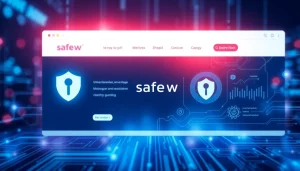Mastering Cyber Security Courses: Build Your Skills for a Secure Future
Understanding Cyber Security Courses
What are Cyber Security Courses?
Cyber security courses are educational programs designed to equip individuals with the skills and knowledge necessary to protect computer systems, networks, and data from cyber threats. These courses cover a range of topics, from the fundamentals of network security to advanced methodologies for combating hackers and malware. They can be offered in various formats, including online classes, in-person workshops, and degree programs. Many institutions offer cyber security courses that cater to different skill levels, making them accessible for beginners and seasoned professionals alike.
Importance of Cyber Security Education
The digital landscape is rapidly evolving, and along with it, the complexity and frequency of cyber attacks. Organizations worldwide are facing unprecedented levels of data breaches, phishing scams, and ransomware attacks, highlighting the critical need for comprehensive cyber security education. Cyber security professionals play a vital role in defending sensitive information, maintaining consumer trust, and ensuring compliance with legal and regulatory frameworks. By investing in cyber security education, individuals not only enhance their career prospects but also contribute to the broader goal of organizational resilience and security.
Types of Cyber Security Programs Available
Cyber security education encompasses a variety of programs tailored to different learning preferences and career aspirations. These include:
- Online Courses: Flexible, self-paced learning options accessible from anywhere.
- Certificate Programs: Short-term programs focused on specific skills or knowledge areas.
- Associate and Bachelor’s Degrees: Comprehensive degree programs covering the fundamentals and advanced topics in cyber security.
- Master’s Programs: Advanced studies aimed at those seeking leadership roles.
- Bootcamps: Intensive training sessions designed to fast-track students into the cyber security workforce.
Key Skills Developed in Cyber Security Training
Technical Skills: Tools and Technologies
Cyber security training typically emphasizes a range of technical skills, including:
- Network Security: Learning to secure an organization’s networks against breaches.
- Cryptography: Understanding encryption methods and their applications in protecting data.
- Intrusion Detection Systems (IDS): Monitoring network traffic for suspicious activity and potential threats.
- PEN Testing: Developing skills to ethically hack into systems to identify vulnerabilities.
- Malware Analysis: Learning to dissect and understand malicious software.
Soft Skills: Communication and Problem-Solving
In addition to technical expertise, cyber security professionals must possess strong soft skills, as they often need to communicate complex security concepts to non-technical stakeholders. Key soft skills include:
- Critical Thinking: The ability to analyze and assess risks effectively.
- Communication: Clearly conveying security issues and strategies to various audiences.
- Team Collaboration: Working effectively with different departments to foster a culture of security.
Practical Skills: Hands-on Experience
Hands-on experience is crucial in cyber security training. Many courses integrate labs and simulation environments where students can practice real-world scenarios, including:
- Simulated Attack Scenarios: Engaging in mock attacks to prepare for real-life situations.
- Project Work: Developing security policies and strategies in a team environment.
- Internships: Opportunities to work in actual organizations to gain practical exposure to challenges faced in the field.
Choosing the Right Cyber Security Course for Your Needs
Assessing Your Current Skills and Knowledge
Before selecting a cyber security course, it’s essential to evaluate your existing skills and knowledge. This assessment can help identify areas where you need improvement or additional training. For instance, if you already have a foundation in IT but lack specific knowledge in network security, you might choose a specialized course that focuses on that area.
Evaluating Course Content and Format
When choosing a cyber security course, it’s important to review the syllabus and ensure that the content aligns with your learning objectives. Check if the course covers practical applications, industry-relevant tools, and current best practices. Additionally, consider the format that works best for you: online courses offer flexibility, while in-person classes may provide more interactive, hands-on experiences.
Considering Certification Options
Certifications can bolster your resume and demonstrate your commitment to the field. Popular certifications include CompTIA Security+, Certified Ethical Hacker (CEH), CISSP, and Certified Information Systems Auditor (CISA). Assess whether your chosen course prepares you for certification exams, as many programs are specifically designed to align with these credentials.
Top Cyber Security Courses and Programs in 2023
Online vs. In-Person Training
The decision between online and in-person training often depends on personal preferences, learning styles, and schedules. Online courses provide flexibility, allowing learners to work at their pace and schedule. In contrast, in-person training offers immediate, interactive feedback and opportunities to engage directly with instructors and peers. Many leading institutions have successfully adapted their programs to combine both formats, known as hybrid training.
Industry-Relevant Certifications
In 2023, numerous esteemed certifications at various levels are available to cyber security professionals. These include:
- Certified Information Systems Security Professional (CISSP): An advanced certification for experienced security practitioners.
- Certified Ethical Hacker (CEH): Focuses on penetration testing and ethical hacking techniques.
- CompTIA Security+: An entry-level certification suitable for those new to cyber security.
- Certified Information Security Manager (CISM): Aimed at those in security management roles.
Leading Institutions Offering Cyber Security Courses
Several high-profile institutions offer exceptional cybersecurity programs. Notable names include:
- Stanford University: Renowned for its comprehensive curriculum in cybersecurity, focusing on both practical and theoretical aspects.
- Georgia Institute of Technology: Offers an online master’s in cyber security that is highly rated.
- University of Maryland University College (UMUC): Provides various certificates and degree programs purely focused on cybersecurity.
- Harvard University: Offers professional certificates in cyber security, emphasizing real-world applications.
Measuring Success After Completing a Cyber Security Course
Career Opportunities in Cyber Security
The cyber security field is expansive, with numerous career opportunities expected to grow in the coming years. Common career paths include:
- Security Analyst: Responsible for monitoring, preventing, and responding to security incidents.
- PEN Tester: Conducts ethical hacking assessments of systems and networks.
- Incident Responder: Acts as a first responder to security breaches.
- Security Consultant: Advises organizations on cyber security strategies and defenses.
Continuing Education and Lifelong Learning
In an ever-changing field like cyber security, maintaining skills and knowledge through continuous education is vital. Many professionals pursue advanced certifications, attend workshops, and participate in conferences to stay updated on the latest trends and technologies. Networking with other professionals and engaging with thought leaders can also provide valuable insights into emerging challenges and solutions.
Industry Trends and Future Outlook
The future of cyber security will be shaped by several emerging trends, including the increased use of artificial intelligence and machine learning to predict and manage threats. Additionally, with the shift to remote work and cloud computing, organizations will continue to face challenges in securing distributed environments. Staying informed about these trends and adapting training and strategies accordingly will be paramount for cyber security professionals.














Post Comment